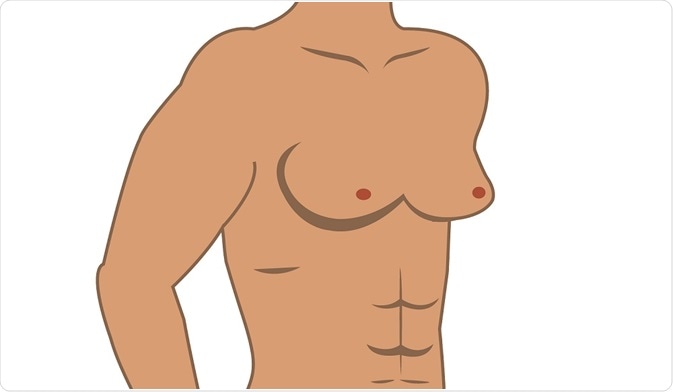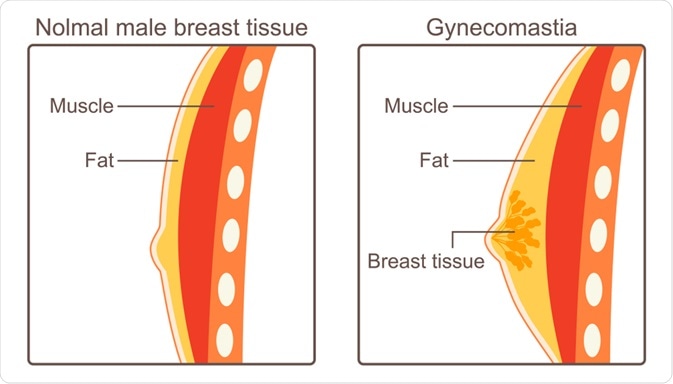Gynecomastia is a condition characterized by the development of enlarged breasts in males. There are many causes of gynecomastia; physiological, age-related, and drug-induced gynecomastia being just a few.
 Indy way FOTO | Shutterstock
Indy way FOTO | Shutterstock
Both androgens (male hormones) and estrogens (female hormones) are present in males. The male hormones determine masculine characteristics like facial hair, baldness, male gonad development and male pattern of muscle and bone development, among others.
Normally estrogen is present in very low amounts in males. When there is an imbalance between the male and female hormones in men, they may develop feminizing characteristics. Notable among these is gynecomastia.
Is gynecomastia normal?
Gynecomastia may be physiological at three stages of life: in the neonatal period, at puberty, and in aging males. In all three cases it is due to relatively high estrogen levels.
In newborns, breast development may be accompanied by milk secretion. This happens because of high levels of female hormones in the mother during pregnancy that continue to stimulate breast tissue in the newborn. This typically resolves in a week or two.
Adolescent boys develop breast buds that usually reduce to normal size in a year or two. This is also due to the changes in the levels of male and female hormones around the time of puberty.
Estrogens are, in fact, essential for proper bone elongation and growth. A rise of these hormones during puberty is thus normal, and may be accompanied by breast bud development in pubertal boys in up to 60% of cases.
Elderly men often develop gynecomastia because of age-dependent declines in the testosterone levels, which leads to a comparative increase in estrogenic activity on breast tissue.
 CHEN I CHUN | Shutterstock
CHEN I CHUN | Shutterstock
Drug-induced gynecomastia
Some drugs have been known to be linked to gynecomastia, by several mechanisms such as their estrogenic properties, stimulation of estrogen production in the body, or supplying molecules which are easily converted to estrogen. These include:-
- Estrogen vaginal creams, topical estrogen spray and herbs containing phytoestrogen
- Certain antifungals
- Some diuretics
- Certain cardiac glycosides
- Certain antibiotics
- Some antacids
- Some anti-androgens used to treat prostate cancer or enlargement
- Certain drugs used to treat AIDS
- Some anxiolytics
What are the other causes of gynecomastia?
Gynecomastia may also be seen in the following situations:
- Chronic liver disease may increase female hormone production and lead to gynecomastia
- End-stage renal disease, due to associated testosterone deficiency
- Inadequate levels of testosterone or male hormones
- Exposure to female hormones
- Anabolic steroids
- Certain illicit drugs and alcohol
- Radiation therapy and cancer chemotherapy, especially for testicular and prostate cancer
- Male hypogonadism, which may have several causes; genetic disorders associated with low testosterone levels in males, such as Klinefelter’s syndrome (which causes malformation and underdevelopment of the testes accompanied by gynecomastia), acquired testicular diseases causing primary hypogonadism, or enzyme deficiencies
- Thyroid disorders, especially associated with hyperthyroidism
- Tumors which secrete estrogen, including those of the testes, adrenal glands or pituitary gland, can alter the balance of estrogens and androgens in males
- Malnutrition or severe dieting is associated with lowering of the testosterone levels without a corresponding dip in estrogens, causing gynecomastia in some cases, but refeeding after malnutrition is more common
- Some herbs like tea tree or lavender have been associated with gynecomastia, purportedly due to their weak estrogenic action
In many cases, the cause remains unknown.
Does gynecomastia mean breast cancer?
Sometimes breast enlargement may be due to an underlying tumor or cancer in males, but this accounts for only 0.2% of all male cancers. Breast cancer in men is rare but needs to be excluded when gynecomastia is detected.
Breast cancer most often shows up as a lump that is firm or hard with or without pain and discharge from the nipples. Tumors and cancers tend to cause enlargement of a single breast, while gynecomastia is typically bilateral.
Further Reading
Last Updated: Nov 16, 2018